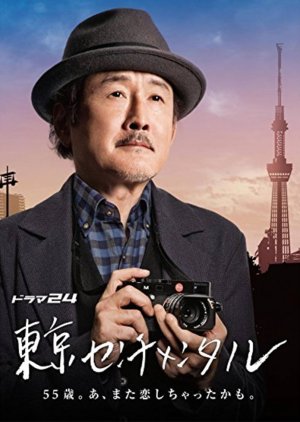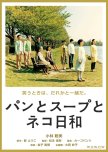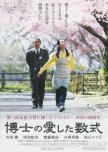
This review may contain spoilers
* MINOR SPOILERS*In Seinfed, Jerry Seinfeld is famous for having a new girlfriend every week (a fact that is self-referenced later on in the series), and in this show we see an older middle-aged man (age given as 55 but looks older to me) looking for love with a new woman or girl each week, while one of his ex-wives skirts the border of his life. The difference between the two shows is that Seinfeld does not take itself seriously while this show takes itself a little too seriously, with the main character, confectioner Takuzo-san, given to extended inner dialogues that feel like they should be punctuated by comedy (as used so brilliantly in 2003's Manhattan Love Story) but instead his eyes scrunch up earnestly as he convinces himself that this new girl he's known for ten minutes (usually) might be the one he is falling in love with.
A drawback to this is that each time this happens it diminishes the previous episode's woman or girl (at least one of the dates is thirty-five years younger than his character), and this lack of an overall arc or development is the major frustration when watching. It seemed as if the ex-wife was going to be used in this way but then she is shoved out of the way and sent to Kyoto.
I watched this because I am a fan of Takahata Mitsuki, who here plays Takuzo's assistant Akane, and the one episode that centres on her is probably my favourite - as a whole she is quite underutilised, given to either scolding or mocking Takuzo. The show would have benefited greatly if she had been given a side arc herself which could have been woven into Takuzo's for a satisfying ending - at least the writers did not end up making Takuzo and Akene and fall in love, which is something I began to worry about halfway through.
What I did really enjoy though were the little guided tours of Tokyo, the history of districts and notable landmarks. I would happily watch an entire series of Takuzo just going for walks through Tokyo and giving us these little history lessons, forget the romance, just a lovely series of amiable walkabouts.
Overall if you get past the first couple of episodes the series has some charm, but the potential was there to achieve so much more.
Was this review helpful to you?

Just as good as the original SP!
If you liked the original SP, there's a high chance you'll like the drama as well!Yoshida Kotaro gives another solid performance as the main character whose real age doesn't really match his heart's (meaning, he's so young at heart that he'll always fall in love at first sight - just to be brought back to reality before each episode ends, LOL) and whose best quality is that, despite being initially moved by maybe-not-so-pure-intentions and by a pretty self-centered attitude (always thinking that the woman is interested in him, LOL), in the end he always puts the other person's feelings and needs first, showing the moral strength of an Edo-period samurai. Such a beautifully written character, indeed! (oh, and while we're at it: it's so refreshing to have a middle aged man as the main character! I wish there were more dramas like this!)
The supporting cast also does a nice job, particularly Takahata Mitsuki and Ogura Shun, who make up with (acting) quality to what they might lack in (screentime) quantity, giving a lot of depth to their characters - so much friendship transpires through those meaningful - and often silent - glances they give Kururi-san everytime he goes off on a tangent, convinced as he is that he's found his next bride-to-be.
The script is mostly very well-written, although some episodes are definitely better than others - as it's to be expected; the music is really nice and adds to the whole viewing experience, just like the direction and photography.
I think the only "problem" this series has (and that's the reason why I don't give it a "perfect 10") is that it's tremendously repetitive after a while; in order to avoid being bothered by this aspect, I'd suggest you do like me and dilute the watch over a longer period, so that each episode can feel "fresh" (I totally think this is NOT the series you'd want to binge-watch!)
Was this review helpful to you?

Life is like a box of Nagamashi
Tokyo Sentimental centres around Karuri Takuzo, who is a maker of traditional Japanese sweets. The drama is best viewed like a collection of sweets, individually wrapped and testing better when not consumed all at once.The structure of each episode is really simple: A hopelessly romantic dreamer in his mid-50s "falls in love" each episode and wanders around a specific part of Tokyo with his new love, before the episode and the new love end.
The drama is very well named. It is all about Tokyo, and about being sentimental. There is no central plot or story arc connecting all the episodes, they really are like individual treats. Because they are all very similar, watching a lot of them back to back can be a little much, in the same way that having too many sweets all at once can be a little much. Taken one or two at a time, they are deliciously sweet and enjoyable.
I really like this drama for a couple of reasons: first of all I had the pleasure of QCing the subs for the first five episodes, which meant lots of long lingering looks at each of those episodes. Second, I like the fact that Karuri-San is a man of roughly my age. A confirmed bachelor who never stops dreaming of finding "the one" he reminds me of Don Quixote, a man whose perceptions of himself are strikingly different to the way others perceive him.
This Don Quixote also has a Sancho Panza. Takahata Mitsuki absolutely shines as his very levelheaded shop assistant/reality anchor Sudo Akane. Their relationship is strictly platonic and a nice demonstration of how dramas can show warm close friendships that have nothing to do with romantic attraction. Akane-chan gets one episode in which she is the central character, and experiences her own crush, and that is one of the highlights, both for giving her the focus she deserves, and also as a break from the formulaic nature of the basic structure of most episodes.
There is one other episode in which despite conforming to the standard formula there is a lot more emotional depth. The episode in which Karuri-San interacts with a woman he knew as a child who now has dementia was very touching, and gave Yoshida Kotaro an opportunity to show more emotional depth and range and his character. The episode in which the actor plays the shopkeeper learning to be an actor was also one that stood out for me.
The other thing which makes this drama a success is the fact that each episode does feature the same object of affection - Tokyo itself. The episodes are actually named after the part of Tokyo in which they are set, and as someone who is unlikely to ever go, the languorous and loving look at the byways and alleyways and nooks and crannies of various parts of Tokyo is a standout. In the life of the lead, women may come and go but the city he loves remains, and he loves sharing his encyclopedic knowledge of that beloved city with each of his episodic dates.
So if you want to show that celebrates Tokyo, that embraces mature middle-age and that can be a lot of fun in small doses, do try an episode or two of Tokyo sentimental. Then, before "sweet" becomes "cloying, " put the box away and have a couple more on another day.
Was this review helpful to you?









































